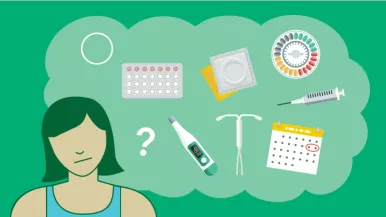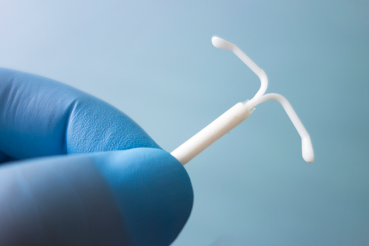Birth control is a personal decision, and there are multiple options available to fit your lifestyle, budget and readiness or desire to have children. Your age and health history may also factor into your decision.
We talked with Kelly Fitzgerald, NP, about how to choose the right birth control for you.
How do you find the best method for you?
Birth control methods are usually split into two main categories: hormonal and non-hormonal.
Hormonal birth control methods include oral contraception, the ring, the patch and the birth control shot (Depo-Provera). This category also includes long-acting reversible methods like the hormonal IUD and the implant (Nexplanon).
Non-hormonal birth control methods include the copper IUD, ovulation tracking and barrier methods (like condoms and diaphragms).
For more information on how the different types of birth control work, check out our story here.
Fitzgerald makes it clear to her patients that whichever birth control method they choose is their decision. She does not recommend a single method, but presents the benefits and drawbacks of each to help her patients make an informed decision.
“When I talk with patients, I try to elicit their preferences and understand what their priorities are,” says Fitzgerald. “It’s important for patients to think about all the factors and what’s most important to them, as well as any non-contraceptive benefits that may be important to them.”
Some of the factors that may be important to you could be:
- Effectiveness
- STI protection
- No hormones
- Having a mistake-proof method
- Not having to think about it every day
According to Fitzgerald, the most commonly used methods of birth control are female sterilization, followed by the pill. Female sterilization includes tubal ligation (also referred to as “getting your tubes tied”), where the fallopian tubes are blocked or sealed to prevent eggs from reaching sperm.
“However,” she says, “we are consistently seeing an increase in use of the long-acting reversible methods. Patients are interested in the high efficacy as well as the non-contraceptive benefits that some of those methods offer, such as light or no period or improvement of menstrual disorders.”
What’s important to note about birth control is that with most methods, even hormonal methods, you can have a fairly quick return to fertility. “If you do want to get pregnant,” says Fitzgerald, “I recommend starting prenatal vitamins or folic acid before discontinuing whichever birth control method you are using.”
Additionally, while long-acting reversible methods are approved for longer periods of use, Fitzgerald explains that they can still be beneficial even when used for short periods of time.
“What I don’t think a lot of people know is that you can discontinue use of long-acting reversible methods whenever you like — so even if you choose a long-acting method, you’re under no obligation to use it for the full length of time. However, you can still get the benefits that come with that method for as long as you want them.”
Telehealth and birth control
Getting birth control via telehealth (with apps such as Nurx and the Pill Club) has become more popular in recent years. While every person is different, and some people may need or want to see a provider before starting birth control, telehealth is an easy way to access birth control on your schedule.
Says Fitzgerald, “Contraceptive counseling via telehealth is something I do frequently. Additionally, with telehealth it’s easy for providers to prescribe or refill birth control without seeing someone in person. Even with apps, there is still usually a provider behind the app, and if a patient answers ‘yes’ to a red-flag question, a provider will check in with the patient.”
You can also easily get birth control refills from a Rush Connect Virtual Urgent Care provider.
Whichever method you choose, Rush is here to help you access birth control information and connect with providers at your convenience.





